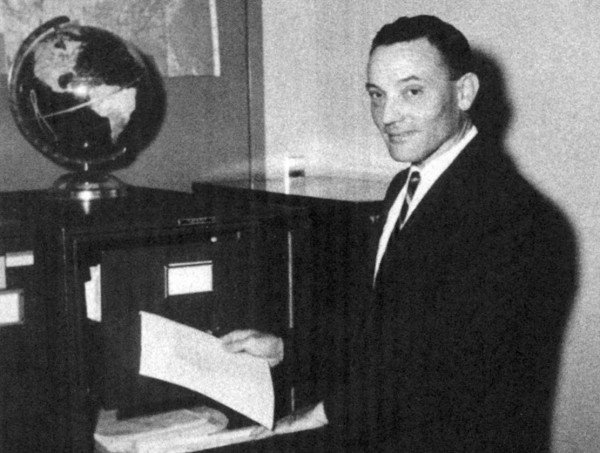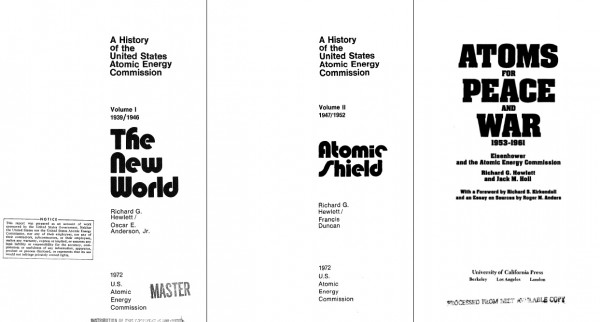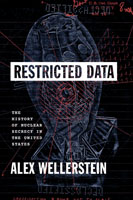Richard Greening Hewlett, the first official historian of the Atomic Energy Commission, has passed away at the age of 92. 1
I never knew Hewlett, but nobody can work in this field without acknowledging the huge debt they owe him for his work. Hewlett began working for the Atomic Energy Commission (AEC) in 1957, working to write a volume on the Manhattan Project and establishment of the AEC. In doing so he was also establishing the History Office of the AEC, which was dedicated to cataloguing and preserving these vital records. One of his greatest coups was discovering, entirely by chance, a locked safe in a basement of an AEC building that turned out to contain the Bush-Conant files relating to the creation of the atomic bomb, one of the most important document bases for any history of the Manhattan Project (and one which I have relied upon extensively).
Hewlett continued at his post through the abolishment of the AEC and the subsequent creations of its successors, the Energy Research and Development Administration and the Department of Energy. He retired in 1980, and went on to co-found History Associates, one of the only private companies dedicated to doing serious historical work.
Hewlett’s volumes on AEC history are extremely useful resources, and I end up citing them often. They can be tricky to work with, though, since Hewlett was not always able to cite his sources very precisely (on account of many of them being classified or kept internally), and the sort of “official historian” he was meant that he rarely strayed too far beyond the most “orthodox” versions of these histories (he was never courting controversy). I have found in many instances that when I look up a document that Hewlett cited, it turns out that he basically just paraphrased what the document said and presented that as what happened — and sometimes that is valid, sometimes that is not. Documents require their own contextualization, their own careful reading, to get the full story, and Hewlett’s approach can feel a little naive in retrospect. It is an old-style of history, official or not.
Still, he was essentially carving out the first draft of this historical work, and approaching it seriously, and that required a Herculean effort in its own right, both in terms of collecting the source material and navigating the federal bureaucracy to get these histories published. In a 1997 interview with Public Historian, Hewlett described how Admiral Hyman G. Rickover essentially abused classification restrictions in order to force Hewlett to write a book on the nuclear Navy, with Rickover at the center of it. Hewlett ran into further complications later when he attempted to write about nuclear waste — a topic that does not make the AEC look extremely on top of things. 2
I’ve read a number of narratives from public historians working with secret topics. It seems like a tricky prospect. Barton Hacker, who wrote on the history of radiation exposure and protection, told me that his security clearance rarely got him anything that wasn’t basically already knowable from the “outside,” and caused interminable difficulties when he tried to get things published that made anybody currently in office, or any still-existing agency, look anything but perfect. As he put it later, some bureaucrats “objected to what they called ‘editorializing,’ which seems to be the bureaucratic term for drawing conclusions.” 3
I have never wanted a security clearance, and would never accept one, for this reason. To learn something interesting but not to be able to tell anyone about it seems like a bad exchange. I want to know things, but I also want to tell things — storytelling is my profession, in a sense. To get a clearance means you are in an entirely different category from the perspective of a classifying agency, and even innocuous information that everybody knows can end up on the cutting-room floor. No thanks.
Hewlett’s AEC histories are all scanned and online, posted in various archives by the US federal government, some on the Department of Energy’s History Publications page. Because they are all in the public domain (they are all “work for hire” for the US government, which makes them uncopyrightable), and they are all out of print, I am going to mirror them here:
- Richard G. Hewlett and Oscar E. Anderson, Jr. A History of the United States Atomic Energy Commission, Volume 1: The New World, 1939-1946. University Park, Pa.: Pennsylvania State University Press, 1962.
- Richard G. Hewlett and Francis Duncan. A History of the United States Atomic Energy Commission, Volume 2: Atomic Shield, 1947-1952. University Park, Pa.: Pennsylvania State University Press, 1969.
- Richard G. Hewlett and Jack M. Holl. Atoms for Peace and War, 1953-1961: Eisenhower and the Atomic Energy Commission. Berkeley: University of California Press, 1989.
- Richard G. Hewlett and Francis Duncan. Nuclear Navy, 1946-1962. Chicago: University of Chicago Press, 1974.
I find these scanned copies perhaps most useful of all, because they are searchable. The Hewlett volumes can be dull reads in places (he embodies a certain model of official historian that tries to keep up an appearance of “just the facts”), but they make excellent resources to run keyword searches through. It is too bad nobody has really tried to do one of these kinds of volumes for the final chapter of the AEC’s history (1962-1974). 4
The source note to The New World has one of my favorite lines about nuclear history and the reason why there are more resources that one might expect:
The records have survived. For this, scholars can thank two much-maligned practices of the bureaucracy: classification and multiple copies. Classified documents endure; they do not disappear from the files as souvenirs. As for copies in sextuplicate, their survival is a matter of simple arithmetic. If the original in one agency is destroyed, the chances are better than even that one of the five carbons will escape the flames in another. 5
To this we must add that people like Hewlett took the time to track them down, catalogue them, and get them eventually transferred into repositories (like the National Archives and Records Administration, for all their difficulties). This final action, so crucial for the later historian, does not happen on its own. This may be Hewlett’s greatest legacy in the end. The texts he wrote will inevitably be superseded by later works of history — but those superseding works will be utterly reliant on the preservation work he did, those acts of finding and saving and cataloging of the records. Rest in peace.
- I thank Stan Norris for bringing this to my attention.[↩]
- Richard G. Hewlett and Jo Anne McCormick Quatannens, “Richard G. Hewlett: Federal Historian,” The Public Historian 19, no. 1 (Winter 1997): 53-83, esp. 73-77.[↩]
- Barton C. Hacker, “Writing the History of a Controversial Program: Radiation Safety, the AEC, and Nuclear Weapons Testing,” The Public Historian 14, no. 1 (Winter 1992): 31-53, on 45.[↩]
- My favorite, detail-heavy books that cover the latter period of AEC history well are Brian Balogh’s Chain Reaction: Expert Debate and Public Participation in American Commercial Nuclear Power 1945-1975 (Cambridge University Press, 1991), and J. Samuel Walker’s The Road to Yucca Mountain: The Development of Radioactive Waste Policy in the United States (University of California Press, 2009), though they only cover the power and waste aspects of it (as opposed to, say, the weapons angles).[↩]
- Richard Hewlett and Oscar Anderson, A History of the United States Atomic Energy Commission, Volume 1: The New World, 1939-1946 (University Park: Pennsylvania State University Press, 1962), 657.[↩]




Alex, thanks for this post and your thoughts on the “official” history genre. I can’t speak for others, but I know I had to go through a bit of “deprogramming” post-grad school before I could regard the genre as a valuable resource, not just as something to be written against. And it was Hewlett and Anderson that really converted me. I was finally delving into the Manhattan Project history in a serious way for some work I was doing at AIP, and suddenly found that—magnificent as it is—Rhodes’s book (the key book on the topic that one read in grad school) is not really the place to go if you need easily accessible information on the structure of the project, key dates, official responsibilities of individuals, and so forth. Lo and behold, the official history turned out to be really good for that sort of thing!
Anyway, a few years later I’ve found myself working for the company Hewlett co-founded. For many years, History Associates continued to do a lot of histories in the official history line. That is a much smaller part of the business now, though I’ve just started in on the history of a defunct Navy laboratory, the object of which is to make archived data produced by the laboratory more usable by connecting it to the historical circumstances that produced it, e.g. research program development, experiment design, etc. Which is actually, I think, a very interesting way of “applying” the history of science.
Naturally, there are drawbacks to “inside” history. I would never recommend that anybody take anything that I’ve written here at History Associates and accept it unquestionably as a full, rigorous, objective treatment. Generally, my name doesn’t appear on the cover, nor would I allow it to in most instances. (At the same time, I would caution anybody from taking an “academic” treatment and accepting it as full, rigorous, or objective, either, simply because it lacks obvious institutional conflicts of interest. As I argue in my academic book, the self-identity of the author as an unencumbered critical intellect can also carry with it very powerful conflicts.) At the same time, though, I wouldn’t consider the material I produce on contract to be irrevocably compromised—I think a lot of it is really valuable. To an extent this is just a matter of making available historical material that would otherwise never see the light of day. But, often, I’ve been able to meld some very interesting analysis into the story of the organizations I’ve written about; all you have to do is read around the insider “tone” to obtain it.
All this is to say, I think your analysis of official history is good, and I hope historians avoid thinking of it as “skippable” or debased, which was sort of how I thought about it back in 2007-08.
I have done a little “history for hire” over the years (I wrote a History of the MIT Physics Department for an interactive kiosk and their website, despite not being credited for it!), and agree it is a tricky thing. I get the limitations of it — when you’re working for someone else to make a product with a specific outcome, it definitely affects what you write and how you write it. Official histories have their place and I think they are in the realm that you mention — they are the place that should strive to get the bare bones facts right, so that later historians with a bit more freedom can do more interpretive work. I find J. Samuel Walker’s work to be very good despite his (now retired) official role in the Nuclear Regulatory Commission; he managed to still come to useful, often deeply critical conclusions despite his position.
I don’t think it’s skippable, but it has a specific role to play which is different from that of academic history. I think Hewlett’s work benefits me most as a good place to start and to search for references. (Which is why I am happy to have them be searchable.) When I delve into the the details of the documentation, I often find that I don’t agree with him, but that’s fine. The main problem with his AEC histories is that he assumes a sort of benevolent bureaucratic rationality that just did not always exist — sometimes decisions get made for bad reasons or no reasons, and his approach to the past seems to have not found that an acceptable model of historical actors. Everything is a little neater and tidier in his books that I think was actually the case.
I’ve just had an interesting and insightful paper passed on to me this week, written by Richard Hewlett, “Public History in the United States: A Retrospective Appraisal,” which appeared in a 1988 festschrift for Margaret Gowing called Science, Politics, and the Public Good. It offers, I think, a very thorough, candid look at the terrain and practices of government and contract history, and prompts a couple extra thoughts. I do want to be sure to make clear that, to be done well, contract work requires rigor, creativity, and integrity. The key difference with academic history, of course, is that authorship is shared with the organization it is being done for, and often (though not always) the role of the historian is to help the organization speak historically for itself, which does of course mean the organization will have significant editorial oversight.
One interesting feature of insider work is that, while the organization does have final say over it, the organization is also generally very interested in the quality of the history, and will push the historian to correct real errors in fact and interpretation in a more thorough and informed way than academic colleagues might. The organization has a stake in this precisely because it is their history, and it has their name on it. With contract work, I do personally feel it’s appropriate for the writer to cede authorship to the organization (while being given credit for the work in acknowledgments). I believe this helps avoid confusion as to in whose voice the work is supposed to speak, which helps the reader interpret the work—appreciating its virtues, and critically evaluating its perspective on events. That’s perhaps a clearer way of restating what I was saying in my prior comment about authorship. I should also be careful to note that these are my own thoughts on the matter; they don’t come from Hewlett’s piece, nor are they (or any of my other points) necessarily the view of my employer.
Again, it’s an interesting set of questions that needs to be discussed more broadly. Thanks!
In my quest for the H-bomb secret in 1978, I waded through volume 2, “Atomic Shield,” which I found to be unreadable, at least for my purposes. It covers the years 1947-1952, when the production complex was being expanded and redesigned for the mass production of H-bomb components. The heavily censored book illustrated my argument that no one could make any sense of the factory system without knowing what the essential components of its ultimate product were. I couldn’t imagine the work that went into that huge book, telling the story without telling the story. It was almost as if the 1945 Smyth report had been written without mentioning uranium or plutonium. When the H-bomb secret was declassified in 1980 following The Progressive case, I contacted Hewlett to see if he was interested in revising “Atomic Shield” in light of the newly declassified information. He said he was done writing about nuclear bombs, and was on to other things. I couldn’t blame him.
I’ve read them all cover to cover, and I agree with you completely. The details about bomb development, about the expansion of the production facilities, about the governance of the closed communities and of course the details of the H-bomb itself, are all dealt with in passing. While Atomic Shield looks deceptively like The New World on the shelf, it has nowhere near the level of detail.
I know it’s a bit off topic from the blog post but for someone like myself from a non-nuclear weapon state (Italy) is really puzzling that the whole “atomic energy act” is still enforced in 2015.
I’ve read Critical Assembly and enjoyed it very much, and i was shocked to discover that there’re files from the Manhattan project that are still classified (after 70 years!).
I would love to know if there’s a time limit for secret documents in the USA, surely they cannot keep something forever hidden from public eyes?
The Atomic Energy Act is still the rule of law until someone gets rid of it and nobody has ever tried to do that. There is no formal expiration date for nuclear secrets — they are exempt from mandatory declassification.
Thanks for the explanation Alex, and sorry for the late reply.
Guess i’ll have to wait for your book to come out to really learn the story behind the Atomic Energy Act secrecy. Is there an ETA for publication yet?
I’m certainly no expert on law, but is something like that even constitutional in a democracy like the US? I mean, nobody has ever fought to get rid of it even after the end of the cold war? I’ve to say it’s surprising for me that everybody just took for granted that knowing the details of a nuclear bomb is something must be forever forbidden to the public.
After all now we know much more about weapons’ physics in the public domain without any negative consequence and IMHO even if you could see a cutaway photo of a W88 or even a Mk.3 there is still a long road to go before you can build one (and, of course, the key is to keep controls on the materials, not the informations).
No strict ETA yet, but working on it!
As for the Constitutionality of the Atomic Energy Act — many of its key provisions have not been tried in court, and some of them (like the “Restricted Data” “born-secret” clause) which did end up in court (e.g. in USA vs. The Progressive, 1979), came close to being ruled unconstitutional. There is nothing in the Constitution which explicitly rules against secrecy except when it comes into conflict with the freedom of the press/First Amendment, where it infringes on the ability of private individuals to publish or talk. Those with secrecy clearances are bound both by the Espionage Act (whose Constitutionality is murky) and the contracts they sign with the government upon taking their jobs.
As for whether they historically took this for granted — they did not. In fact the present status of things would be very surprising to people who worked on the Manhattan Project at the time. Many of the top administrators on the project assumed most of the secrecy would evaporate when the war ended. My book will go into why it did not.
Most of our efforts at counter-proliferation and counter-terrorism are not focused on secrecy, or on “explicit knowledge” (the main target of secrecy — stuff you can write down), but are focused on materials. This was Oppenheimer’s contribution to the Acheson-Lilienthal Report, and an attempt to get people to stop worrying about secrets as much. It didn’t quite succeed!